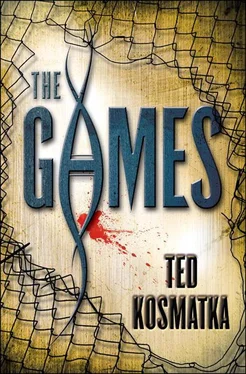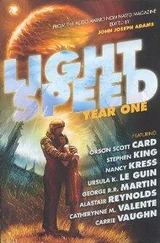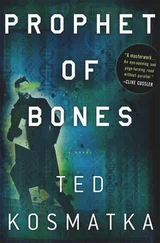The flags were at the top of their poles, and the crowd was on their feet. Inside the skybox, people shifted toward the windows, jockeying for visibility. The glass was soon blotted with gawkers, except for a two-foot gap on either side of Baskov, where no one dared encroach.
Voices in the skybox grew louder, faces pressed to glass, staring down.
Baskov had been here, at this moment, many times. He watched the faces. There was a unique thrill that pervaded these nights—even Baskov felt it—that stretched back through time to something older, more basic. The Romans had only discovered, not invented, it. When all the artifice fell away, what remained was this: two living creatures trying to kill each other. It was nothing less than the original sport.
A few weeks from now, the other Olympics would begin. Men jogging in tracksuits. But this now—
—this was the real shit.
The noise of the crowd spiked. They knew it, too.
Baskov smiled.
Distant movement, and down in the pit, a door began to open.
SILAS SAT on the bed next to Vidonia, their eyes locked on the TV. A graphic of the French flag flapped in the lower-right corner of the screen.
The spectacle of it washed over them. The beautiful fucking spectacle, tens of thousands of people on their feet.
It was a science competition, Silas reminded himself. Not some competitive athletic event. It was surreal—a science competition that hundreds of millions of people would watch. There was only a single rule: no human DNA. All else was wide open. The most profound endeavors have the fewest rules: love, war.
The event was many things. Some good, some barbaric. But among them, this: it was the greatest show on the planet.
Silas reached for her hand.
BASKOV TOUCHED the window again, and the spot in front of him zoomed even larger until the floor of the pit spread across his entire field of view.
The door with the French flag slid up into the wall. At first there was only darkness there, a shadowed rectangular hole eight feet wide by ten feet tall.
Slowly, a shape moved color into the shadow.
Something green and scaly and covered in sporadic tufts of hair.
It was low to the ground and moved like the crack of a whip, a thing part alligator, part wolf, with eyes that didn’t point in the same direction.
Leave it to the French .
To Baskov, it seemed that countries sometimes put out gladiators simply to show they could, without any particular competitive consideration. In reality, the French gladiator was probably less dangerous than the constituent species from which it was assembled. If the French had lacked the demonstrated ability to successfully cross phyla (a tricky thing, even if you knew what you were doing), then they certainly shouldn’t have made their attempt on the world stage. There are basic and fundamental differences between the physiologies of reptiles and mammals, which resisted crossing. As Baskov watched the creature move into the light, he wondered how many distorted siblings it had left behind. How many tries had they made to produce this one fighter?
The tragic creature moved farther into the arena, dragging a long wire-haired tail behind it through the sawdust.
The spectators cheered. In Baskov’s experience, they always cheered, no matter the competitor.
Years ago, before the gladiator competition, there’d been problems with gene doping and genetic tweaks. Web-footed swimmers. Myostatin freaks. Then testing caught up, and the Games enforced the ban.
But the crowds had still wanted the freak show.
They’d wanted this .
Science had wanted it, too—an arena to showcase its newest art form.
So the freak watchers were given the gladiator competition. The single event where genetic engineering was allowed. It became the most popular event in the Games.
And the most vilified.
A second door began its slow ascent. The strange French weregator didn’t even notice.
Behind the Argentina door was something that lacked the French contestant’s seeming docility. Big furry forelimbs dug at the sawdust while the door rose. A head pushed under, then shoulders, a long torso. The creature was out in a flash of brown; and in another instant, it froze, locking eyes on the combatant across the arena.
Baskov was impressed, he had to admit. He hadn’t expected anything like this from Argentina. The gorilla hybrid had claws at the ends of long, muscular arms. Its mouth was a gaping maw of teeth, borrowed from somewhere in order Carnivora.
It surged across the sawdust, kicking up plumes of wood chips in its four-legged charge. The weregator finally noticed and turned, baring its teeth.
The two collided in an explosion of flesh and bone.
Even Baskov was taken aback by the scope of the violence. Their modes of attack were primitive but effective. They latched their jaws onto each other and shook. The weregator had Isaac Newton on its side, but mass only counts for so much. In the end, it was those claws that decided it.
The gorilla thing sank its teeth deeper into a shoulder, tightening its hold. Then it simply began digging into the side of the scaly creature in the same way a dog might dig a hole in the ground. There was blood, then the sound of cracking ribs. The weregator loosened its hold and tried to get away, but it was no use. The gorilla thing held fast and continued digging. The French contestant screamed when its abdominal wall was breached, and then organs spilled out in bright loops, piling between the gorilla thing’s back legs exactly like the dirt behind a digging canine. It was fantastic.
The fight lasted six minutes. The victor was left to feed for another three. The French flag came down, leaving the flag of Argentina flapping alone.
The crowd roared.
When the door slid open again, the icers distended from the walls, blowing freezing clouds of CO 2; the survivor was maneuvered back into its pen.
The men and women in the skybox drifted from the windows, smiles on their satisfied faces. “Damned good match” seemed to be the consensus.
The crowd thrummed outside. What would their reaction be to the strange U.S. gladiator? Baskov wondered. Would they roar? Would they scream?
The cleanup crew busied themselves in the arena. They chained the carcass of the weregator to the back of a small tractor and hauled it away, methodically raking the path smooth behind it. Several others stayed behind to bag up the largest stray clumps of tissue.
Little time was wasted between matches. When the arena was clean, the announcer’s voice came again. It would be Saudi Arabia vs. Australia. This match would be even better, Baskov thought.
Two new flags went up the poles. The skybox crowd—most with freshened drinks in their hands—shifted back against the glass.
The door with the Aussie flag opened first, and Baskov knew immediately why the Australians had been so secretive about their creation. There was certainly no rule, implied or otherwise, that required a gladiator be constituted from species native to the particular country it represented. Such a rule would have put Africa at a prohibitive advantage. But for Australia, it seemed to be a matter of national pride. Their contestant didn’t just step into the arena, it hopped.
The crowd roared, the people in the skybox smiled, and Baskov had to admit it was kind of cute, in a predatory, rip-your-head-off sort of way.
While not so difficult as mammal-reptile crosses, marsupial-placental hybrids were usually just as painful to look at. Like the Argentinean contestant, the Aussie gladiator was surprisingly sophisticated. It was built like a giant kangaroo but armed with bulk and teeth as no kangaroo he’d ever seen. The arms were long and powerfully thick, terminating in vicious hooked talons.
Читать дальше












